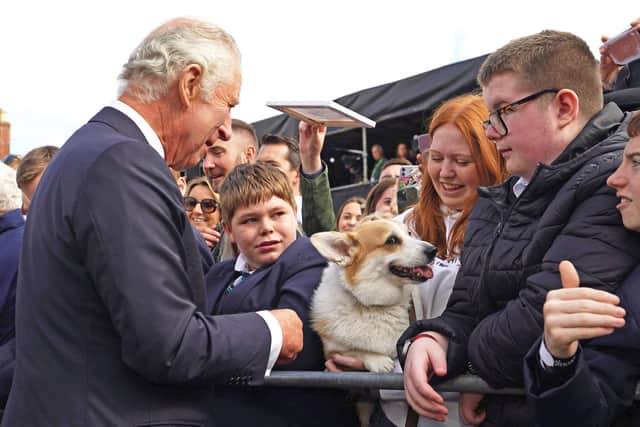Queen Elizabeth II death: King Charles III pledges to support all Northern Ireland’s people
Charles, who in 2015 made a pilgrimage to the site of his great-uncle Lord Mountbatten’s murder in an IRA bombing, said the Queen had “never ceased to pray for the best of times for this place and its people”.
Speaking at Hillsborough Castle in Co Down on Tuesday, the royal residence in Northern Ireland, the new monarch said the late Queen was aware of her position in bringing together divided communities “whom history had separated”.
Advertisement
Hide AdAdvertisement
Hide AdDuring a Belfast memorial service in honour of the Queen, Charles continued the soft diplomacy of his mother when he met another head of state for the first time in his role as King, shaking hands with the president of Ireland, Michael D Higgins.


The King, responding at Hillsborough Castle to a message of condolence on behalf of the people of Northern Ireland from Stormont Assembly speaker Alex Maskey, spoke poignantly about the Queen.
He said: “Through all those years, she never ceased to pray for the best of times for this place and for its people, whose stories she knew, whose sorrows our family had felt, and for whom she had a great affection and regard.
“My mother felt deeply, I know, the significance of the role she herself played in bringing together those whom history had separated, and in extending a hand to make possible the healing of long-held hurts.”
With his Queen Consort, Prime Minister Liz Truss and significant figures from Northern Ireland watching, the King said about the late Queen: “Now, with that shining example before me, and with God’s help, I take up my new duties resolved to seek the welfare of all the inhabitants of Northern Ireland.”
A momentous step forward in Anglo-Irish relations came in 2012 when the Queen shook hands with Martin McGuinness, the then-deputy first minister of Northern Ireland and a former IRA commander.
The late monarch had lost a member of her family in the Troubles, her cousin Lord Mountbatten, who had a close relationship with Charles.
The 79-year-old Lord Mountbatten was murdered on August 27, 1979, when a bomb blew apart a boat at Mullaghmore in Co Sligo, on one of the most violent days in the history of the Troubles that saw 18 British troops die in an IRA ambush.
Advertisement
Hide AdAdvertisement
Hide AdThe Queen’s historic state visit to the Republic of Ireland in 2011 – the first by a British monarch since the Republic’s independence – was another milestone.
She visited significant locations such as Dublin’s Croke Park – the site of the 1920 Bloody Sunday massacre where British forces fired into the crowd at a football match, killing 14 spectators and players – and surprised and delighted the nation by speaking a few words of Gaelic at the start of her state dinner speech.
The speaker of the Stormont Assembly described how the Queen had been part of efforts to build peace in Ireland.
Mr Maskey said she had not been “a distant observer” in the transformation and progress of relationships among the people of the country.
He said the monarch had “demonstrated how individual acts of positive leadership can help break down barriers and encourage reconciliation”.
Mr Maskey added: “She showed that a small and insignificant gesture – a visit, a handshake, crossing the street or speaking a few words of Irish – can make a huge difference in changing attitudes and building relationships.”
The Queen’s recognition of both British and Irish traditions, as well as the wider diversity of the community, was “exceptionally significant”, he said.
Mr Maskey added: “In all of this she personally underlined that one tradition is not diminished by reaching out to show respect to another.”
Advertisement
Hide AdAdvertisement
Hide AdThe Queen’s efforts to foster peace on the island of Ireland were highlighted by John McDowell, Anglican Archbishop of Armagh and head of the Church of Ireland.
Speaking at Belfast’s St Anne’s Cathedral during a service of reflection, he told the congregation: “The word which I think will be most associated with Queen Elizabeth and Ireland, north and south, is reconciliation.
“It is a great New Testament word and it is a great civic word, and it is a hard word.
“So hard in the religious sense that it was beyond the power of humanity to achieve, and God himself had to give it to us as a gift in his son.
“And as a disciple of Jesus Christ, Queen Elizabeth followed where Jesus led, as women often have in the elusive and unfinished work of reconciliation here in Ireland.”
Comments
Want to join the conversation? Please or to comment on this article.